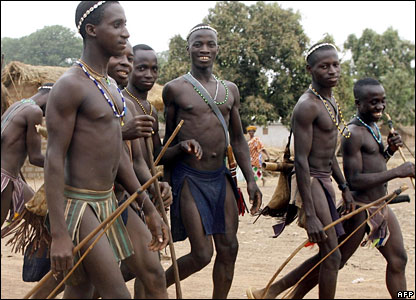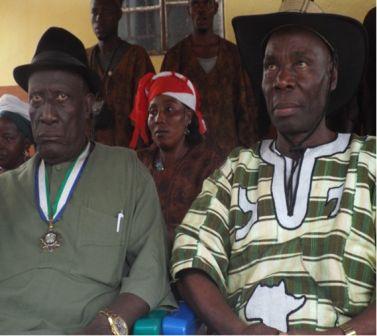I Rest My Case – Madam Elizabeth Simbiwa Shorgboh Torto Was Rightfully Disqualified!
As a native born of Kono District, I have followed with keen interest the issue bordering on the disqualifying of Madam Elizabeth Simbiwa Shorgboh Torto to contest the now gone and forgotten paramount chieftaincy election in Nimiyama Chiefdom, Kono District. The sole reason advanced for her disqualification was her sex, which forbids her from becoming a member of the male based Poro secret society. In Kono District, the tradition is clear on the fact that you must be a member of that society before becoming eligible to contest for any chieftaincy position. Never, since time immemorial, has this tradition been violated.
My position on the matter is therefore straightforward: That Madam Elizabeth Simbiwa Shorgboh Torto was not qualified to run for the position. Maybe after this generation.
While the recently enacted chieftaincy bill stipulates clearly on one hand that both men and women are eligible to become paramount chiefs, the constitution of Sierra Leone on the other hand states categorically that women will be precluded from contesting paramount chieftaincy elections where the tradition forbids.
While this would appear as a sharp and unfortunate contradiction, the million dollar question is which of the two – the aged old national constitution of 1961 and the chieftaincy bill of 2009 supersedes the other?
Even from a layman’s perspective, one can safely conclude that the provisions contained in the in-use national constitution are what we as Sierra Leonean citizens are guided by in our day-to-day conduct. Doing otherwise is always considered a serious crime against the state.      Â
Because the constitution of Sierra Leone fully recognizes the culture and traditions of the people, it would be unconstitutional and woeful for them to be trampled upon just like that.
Sierra Leone is lagging behind today because for too long, the constitution of the land has been unduly tampered with to satisfy the ego of certain influential people, mainly in high political places.
Even where traditionalism is strictly observed, manipulations of the constitution have often seen the wrong people being catapulted as paramount chiefs, thereby igniting disaffection and bad blood among the people.
Avoiding such situations and fostering peace and quiet among the citizenry especially in the rural settings, only means that the exiting traditions must be kept until such a time when the constitution of the land stops recognizing them as being part and parcel of the way of life of a given ethnic group within the jurisdiction of Sierra Leone.
Because Kono District is among the few districts in the country whose tradition precludes women from becoming paramount chiefs, one would state categorically that it was an audacious move by Madam Elizabeth Simbiwa Shorgboh Torto to attempt to test the sacredness of the tradition which her forefathers themselves inherited and observed all though their lives.
This explains the reason why the High Court of Sierra Leone wasted no time in delivering judgment against her when she attempted to seek a court injunction to stay the long overdue paramount chieftaincy election until her ‘right’ to contest the said election was granted.
While I do not in any way support her move because of its counter-productive nature, I however feel very strongly that her courage to have even declared her intention to run for the position has drawn keen attention to a major issue which since the colonial days has kind of remained unnoticed, unaddressed of simply treated with levity.
Monday this week, Madam Elizabeth Torto was ‘repatriated’ onboard a United Nations helicopter back to her chiefdom, few days after the contested election had been conducted and a winner who happens to be her cousin, declared the duly elected paramount chief.
The organized and costly repatriation of Madam Elizabeth Torto is said to have been facilitated by the Human Rights Commission, whose Deputy Commissioner, Madam Yasmin Jusu Sheriff, said in a press interview that “The Human Rights Commission is associating with Madam Elizabeth Simbiwa Shorgboh Torto because we believe her right to contest the paramount chieftaincy election in her chiefdom of birth has been grossly violated”.
She based the Commission’s argument on the fact that the recently enacted chieftaincy bill gave a blanket right to both males and females to contest for chieftaincy elections and become paramount chiefs.
It could be further noted that Madam Yasmin Jusu Sheriff based the Commission’s argument on the provisions contained in the ill-though chieftaincy bill, while as indicated earlier, falls under the purview of the country’s national constitution.
The seeming naivety of the Commission’s standpoint has left many with the question as to whether the Human Rights Commission should have been seen busying itself trying to seek practical ways of clearing all the necessary constitutional and traditional bottlenecks standing the ways of highly competent and reputable women wanting to become paramount chiefs, or engaging in what has been dismissed by many observers as a step in the wrong direction and one that has set a very bad precedence.  Â
This also brings to question the level of competence and sincerely of certain so-called human rights activists whose interpretation of human rights abuse is only limited to a situation wherein someone feels badly disadvantaged and has what it takes to make a lot of noise about it.
While it is the tacit right of the people to solemnly keep what they consider as their God-given traditions, it is also the right of all legally entitled citizens of the country including women to run for any elective position, be it presidential, parliamentary or paramount chieftaincy.
Ignoring the people’s right to maintain their duly recognized traditions is as bad as committing genocide, and this is where I think the Human Rights Commission missed the point.
The road to Madam Torto’s village is motorable, and therefore much as there was no moral justification to repatriate a woman that was neither banished nor placed under any form of threat, there was also no justification for the services of a United Nations helicopter to have been employed.
Even during normal circumstances, Madam Torto never used a helicopter to travel to her village. The question here is what exact message was the Human Rights Commission trying to send by securing a UN helicopter for the sole purpose of ‘repatriating’ a disgruntled female candidate for a position she was not by tradition entitled to contest for. It was an unprecedented move indeed, and one that sent out the wrong message. The use of a UN helicopter also sent out the wrong message. Little wonder why members of the Poro society felt threatened and decided to take full possession of their locality for fear of being overwhelmed by events. The situation would have been quite different had Madam Torto been left alone to ordinarily return to her chiefdom as she herself had used to.
By doing such a thing, the Human Rights Commission has set a very bad precedent that has set the stage for more women to vest interest in becoming paramount chiefs when they very well know that the tradition precludes them. Once they are pronounced not eligible, they will rush down to Freetown with the expectation of being repatriated in an organized way onboard a UN helicopter. Failing which, the Commission will be guilty of practising reckless favouritism.
The commission even challenged the High Court ruling on the matter. Its Chief Commissioner, Edward Sam, openly challenged the ruling saying “We are very disappointed by the ruling”.
What I thought Commissioner Edward Sam and other so-called human rights activists should have been disappointed about is the fact that the drafters of the chieftaincy bill woefully failed to take into account the limitations recognized by the constitution, on which premise the court based its ruling.
Commissioner Edward Sam should be also disappointed in himself particularly as the country’s well paid and well catered for human rights commissioner, for failing to identify the loopholes in the bill. We call that real negligence.
Also culpable of negligence are the parliamentarians who hastily passed the bill, completely ignoring the cultural and traditional limitations in the constitution. This is in fact where I think Madam Torto took the wrong people to court.Â
Even more culpable of negligence is the father of the nation who appended his invaluable signature to such an ill-prepared and ill-intended bill that falls short of absolutely guarantying our women folks in some parts of the country their right to fully participate in chieftaincy elections and becoming paramount chiefs.
The women have started a good thing by staging a protest and presenting the issue for the first time as a major one, and one that requires an urgent solution. Such a move by the women should be backed up by a strong campaign for the repeal of all the legal bottlenecks standing the way of women aspiring to become paramount chiefs.
Our women deserve the right to become paramount chiefs, just as they deserve the right to become presidents, judges, parliamentarians and so on.
I rest my case!
by Theophilus Sahr Gbenda, Sierra Leone
Stay with Sierra Express Media, for your trusted place in news!
© 2009, https:. All rights reserved.







Geir
/
Banning Elizabeth Simbiwa Sogbo-Tortu to
become a chief, because she is a woman, is like banning Obama becoming a president because he is black!
I say: ..Go go Elizabeth!!
Best from Geir
17th December 2009Norway